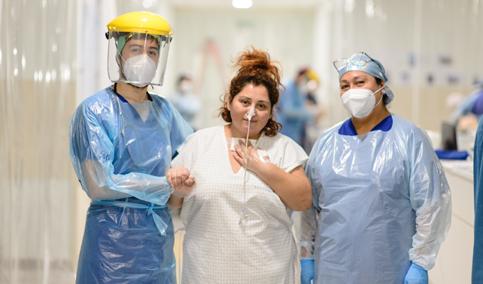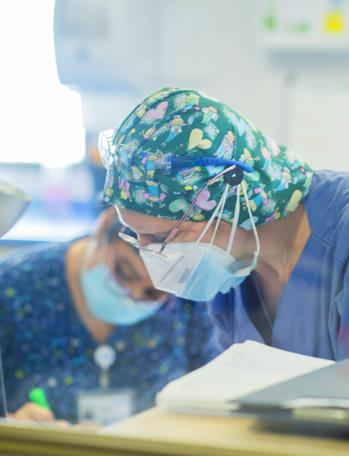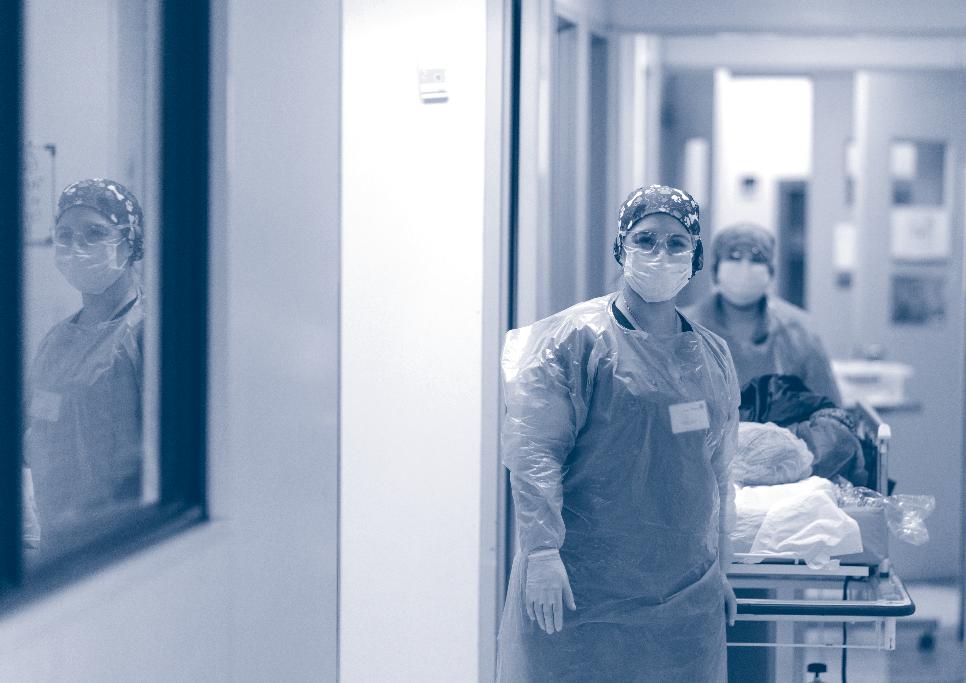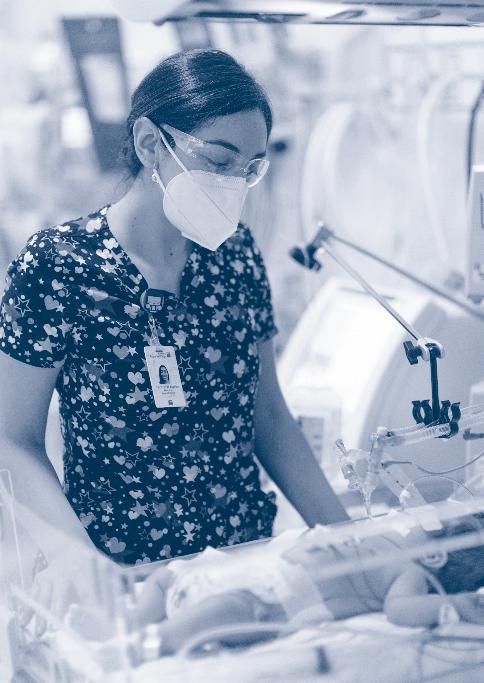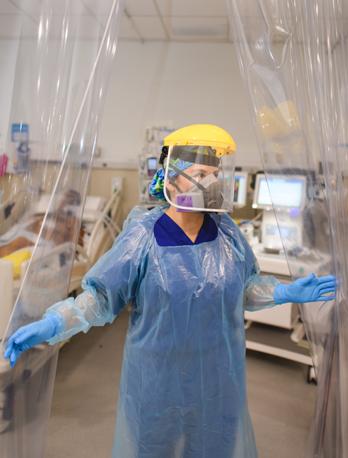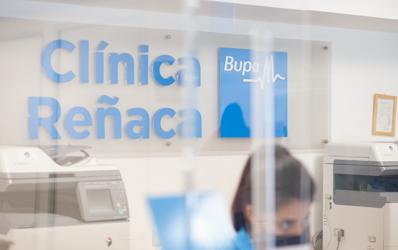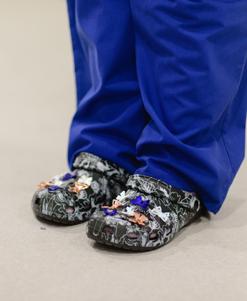
12 minute read
Today we value our team and apreciate life more
As the resident nurse, I had Four of us got together and took on this to visit the whole clinic. I felt new role. As more and more people got the like crying, especially in the disease, things heated up. We could see that everyone was giving their utmost on every emergency unit. I feel like shift. Sometimes it seemed really chaotic. It crying when I think about was very stressful for everyone – the patients, the healthcare teams and the administrative those days, because we were teams who, although they were “invisible” stretched to the limits. were supporting everyone with standards and procedures. At the same time, my boss took on my usual functions so I could get right into the new role. A lot was asked of all of us. For example, there was a time when we had to set up a pre-emergency section, where we set up some chairs for people to sit on before they got through to the old emergency section, because there weren’t enough spaces. The nurses were doing 24-hour shifts and often got no rest at all, because it was relentless. At five or six in the morning we were moving patients. Everyone was worn out and exhausted. People just kept coming and coming and we had to hospitalise them temporarily in the emergency department. It was really hard having to wear the mask all day. You felt you couldn’t get enough air, and it was worse for colleagues working 24-hour
SANTIAGO — CHILE
shifts. You would find people without their masks on and they would say: I am just having a breather, I feel like I am drowning. When we were at a distance from others we could be a little bit more relaxed, taking down the mask for a few moments. A lot of colleagues had sores on the end of their noses, even when they sewed on patches to protect them. As the resident nurse, I had to visit the whole clinic. You felt like crying, especially in the emergency unit. I feel emotional when I think about those days, because we were stretched to the limits, anxious and often felt like everything was completely out of control. I remember the will people had to live. I remember the loneliness of the patients in the emergency rooms with the lights off so they could rest and you would open the door a crack and there was a person all curled up and just about breathing. We went through so much anguish and grief, but there were also unexpected and even magical moments. Comforting situations where you could really be there for people. I remember another colleague who was also a resident. She said to me on my shift, Claudia, I am here, can I help you? She had finished her shift and was also tired, but we took a break and had coffee together. Such gestures were very precious to me. As for triumphs, there were little victories on each shift – just finishing a shift was a victory. Being able to say in the morning: these patients are well enough to be moved, but this other patient has deteriorated and we transferred them; there weren’t enough staff. At times like that you value the small, daily steps. Of course, it’s a team effort. There was a period of change and then we got into a new working routine. That was our triumph: being able to get a work flow going in the emergency unit, meaning we had got a handle on the pandemic. Now, the hospital is getting back to normal and in mid-August we are assessing and making the necessary changes. I don’t want people to see me as a hero – this is my vocation and my profession. I studied to look after patients, not to get a statue made of me. When I decided to go to university, why did I choose nursing? Because my mother is a nursing auxiliary and she encouraged me. Then I realised that since a child this was what I had been doing when I cared for my mother by putting wet flannels on her when she had a fever. It was what I wanted to study and what I wanted to do. I am happy to have been in the line of fire, and I will never forget it. �
I never lost my strength
violeta carrión Nurse Sanitas Jardines de Sabatini

The families called us because they needed us to comfort and calm the residents for them. Sometimes you don’t have that peace yourself, so it is hard to give it to others.
MADRID — SPAIN
One morning on my shift, at the end of March, I was taking temperatures and one of our older residents had a temperature of 38.3 °C. In that moment, I got a fright and thought the thermometer must be wrong. I tried with another, but it still came out at 38 °C. Literally seconds later, he started to cough and seemed really ill. He destabilised in moments and his oxygen saturation levels were very low. I remember what a chaotic morning that was. I was lucky that a doctor came straight away, assessed him and sent him to hospital. When he went on that stretcher, nearly all the staff gathered round to say goodbye. We could see how unwell he was.
We soon found out he was Covid positive and he died a few days later. From that moment, when we had our first positive case, cases started increasing at the home.
I am 28 years old and I live alone. Obviously, I didn’t want to visit my parents or relatives. In April, at the peak, I found it very difficult and was very stressed. To add to it, my sister told me my parents had Covid symptoms. That was when I said, If anything happens to my family, I can’t go on. I lost seven kilos and had no appetite for eating or for anything else.
My parents did actually turn out to be positive, but thankfully they weren’t severly ill. When I realised what a state I was in, I talked to people, particularly my sister, and decided to change my chip. I tried to spend my spare time doing something I enjoyed. Then the infection rates started to go down a bit and I started to feel better.
I never gave up and I always remembered: These patients are all we have and we can’t let them down. We need to give them all we have.
Now that family members can visit their elderly relatives and can see how well we have looked after them, I am really encouraged. �

I wouldn’t change what I went through
constanza núñez Nurse Bupa Reñaca Hospital
On 10 June I woke up with no sense of taste or smell, which we call anosmia and ageusia. I couldn’t taste anything. I called my boss, Carol, and said: I don’t have any taste or smell, I am scared. She said: come to the hospital straight away and we will do the pcr test. Then I went into quarantine. My first pcr test was negative but a second one, fifteen days later, was positive. I was infected by a patient who had Covid and had an anxiety disorder that was not well-controlled. I was coming off my break and he was having a crisis in the corridor and I had to put cold compresses on him. He came in walking and an hour later he was confused, aggressive and needed a ventilator. He was 58 years old and had no underlying illnesses. This happens with hypoxia: the lack of oxygen in the brain makes them confused and overwhelmed. It was really difficult to keep a distance from my family. I knew I had Covid, even though the first PCR test was negative, because the symptoms were obvious. I am the oldest daughter. I have a sister of 21 years old and my parents are still young, so we have a great relationship. Telling my parents I was ill and they couldn’t come over but not to worry was hard. They left me food at the door. I would just put the rubbish out.
It took me a month to get over it – that was the longest month ever. I felt that I wouldn’t die of Covid. I think I was most afraid of getting a blood clot, so I tried to do exercises lying down, as I spent all the time lying down. I couldn’t get up. I didn’t have enough breath to get up. Just going to the bathroom was awful. I would shower sat on the tub. The steam suffocated me. Everything was horrible. I lost six kilos, but I kept going. As I had a high fever, I didn’t even really know what was going on. If the world had ended I would have ended with it. I wasn’t fully aware of anything. On 30 June I started to be able to smell a few things again. I remember crying when I could smell coffee again. I went back to work on 13 July. I knew I would have to get used to using a mask again, so two days before going back, I spent the day wearing it to get me used to full-time mask wearing. I am one of the lucky ones because once I recovered, my scans came out clean. I don’t have any after effects except a bit of a cough which might last a long time. As a hospital, in the Region of Valparaíso we had just one emergency department until March, and everything was dealt with there. From one week to another we divided up the work flow and the emergencies and that was when we started using surgical If the world had masks and full gear. ended I would have During the first few weeks of April the virus was getting ended with it. out of hand and we started to see changes in symptoms: at first it was just fever and respiratory symptoms, then in the first I wasn’t fully aware weeks of May gastrointestinal symptoms and then people with of anything. diarrhoea and vomiting were also suspected of having Covid. In April, we saw the first respiratory problems: someone who came into the hospital with normal saturation levels and after less than an hour their levels went down and they needed urgent mechanical ventilation. In July, patients were coming in in a worse state, because people were afraid of coming in and waited until the last minute at home. So they would come into the emergency department, already gravely ill. Covid is airborne, so although nebulisers are useful we can’t use them, because the virus is transmitted that way. The other thing that made it difficult during the pandemic was the way we dealt with Covid patients. As soon as they were being treated, accompanying people and visitors were restricted, so people preferred not to come to hospital if possible. Personally, I think alongside the vaccine, health education is what will change things. They will be small changes, but they are needed and we will need to live with them. For example, hand-washing, which people weren’t very aware of before, but is now an essential part of our habits. We are social beings and have found it difficult to keep our distance from each other. I think there will be consequences to this difficulty to get close to people. Going back to work, for example, I found out that a paramedic on our team had been diagnosed with terminal cancer. We are supporting each other and taking it a day at a time. We have aromatherapy, background music and group activities, but I think after the pandemic we will need to get more personal, closer to people. I have been an emergency nurse at the clinic for five years. I am 28 years old and have never doubted that this is what I am here for. Nursing is my life and breath. I love it. I wouldn’t change from nursing, or change what I went through. I am thankful for the opportunity to develop professionally and I wouldn’t change my job for the world. �

I volunteered to help my colleagues
óscar cruz Sanitas 24 hours Coordinator Sanitas Healthcare Funding
In the past, our phone calls would be emergency calls and would last three or four minutes. Now they last from ten to fifteen minutes because we are dealing with patients’ worries.

MADRID — SPAIN
On 8 January I became the father of twins, Mateo and Bruno, who are now six and a half months old. My partner’s name is Natalia. She is a nutritionist. We are both on maternity and paternity leave at the moment. I was due back at work on 12 May. Once I had agreed that with my partner, I volunteered to do telephone triage. I couldn’t stay at home watching the news on TV, and decided to support my colleagues because I was afraid my unit was falling apart. We were used to getting between 800 to 900 calls a day and around 20 to 30 emergency video appointments. Now we have around 6,500 calls a day and do over 200 video appointments.
I went to the office to get the computer equipment and set up the new office in the children’s bedroom. As they are twins and still small, we cleared out their room and had them in cribs on each side of our own bed. Then I started doing triage.
At first, I just did calls, as there were a lot of people waiting. We were used to three or four minute calls, which is normal in the emergency unit, responding to all types of emergencies, from patients with headaches to people who were unconscious. But we were now spending ten or fifteen minutes on calls and many of our patients were very worried.
We couldn’t meet the demand of the volume of calls we were receiving, so we recruited new team members and even asked for volunteers from other Sanitas departments. Together with my boss, we decided that I would provide training on the IT systems. Before that, healthcare staff were used to seeing people face to face, not virtually, and this was a big change.
In my case, being a father, I couldn’t stick to exact work hours. I would fit the work around other duties in the day. You think your first experience as a father will be all lovely and in a bubble, although obviously you are worried about your children being born and growing up healthy. My experience is different to that, very unique in all sorts of ways. �

